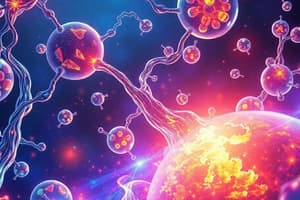Podcast
Questions and Answers
Which statement correctly describes a chemical reaction?
Which statement correctly describes a chemical reaction?
Bonds between atoms break and reform.
Photosynthesis is an example of
Photosynthesis is an example of
an endothermic reaction
The lock-and-key mechanism refers to
The lock-and-key mechanism refers to
the complementary shapes of an enzyme and a substrate.
Which statement best describes the amount of catalyst that remains at the end of a reaction?
Which statement best describes the amount of catalyst that remains at the end of a reaction?
Which statement best describes how a catalyst can speed up a chemical reaction?
Which statement best describes how a catalyst can speed up a chemical reaction?
Which is the best definition of activation energy?
Which is the best definition of activation energy?
How does a catalyst work?
How does a catalyst work?
How can the student identify the catalyst in the experiment?
How can the student identify the catalyst in the experiment?
Which term describes an enzyme?
Which term describes an enzyme?
Lactase and carbonic anhydrase are examples of what type of substance?
Lactase and carbonic anhydrase are examples of what type of substance?
Flashcards are hidden until you start studying
Study Notes
Chemical Reactions
- Chemical reactions involve breaking and reforming bonds between atoms.
- The amount of a catalyst remains unchanged before and after the reaction.
Photosynthesis
- Photosynthesis is categorized as an endothermic reaction, meaning it absorbs energy.
Enzyme Function
- The lock-and-key mechanism illustrates how enzymes and substrates fit together due to their complementary shapes.
- Enzymes act as catalysts, accelerating reactions without being consumed.
Reaction Dynamics
- Catalysts enhance the speed of a reaction by lowering the activation energy required for the reaction to occur.
- Activation energy is defined as the energy needed to break or form bonds of reactant molecules.
Experimental Methodology
- In an experiment involving substances X, Y, and Z, only one serves as a catalyst in the reaction between A and B to produce C.
- The effectiveness of the catalyst can be determined by identifying which test tube stops bubbling first during the reaction.
Examples of Enzymes
- Lactase and carbonic anhydrase are specific types of enzymes, which are biological catalysts that facilitate various chemical reactions.
Studying That Suits You
Use AI to generate personalized quizzes and flashcards to suit your learning preferences.




